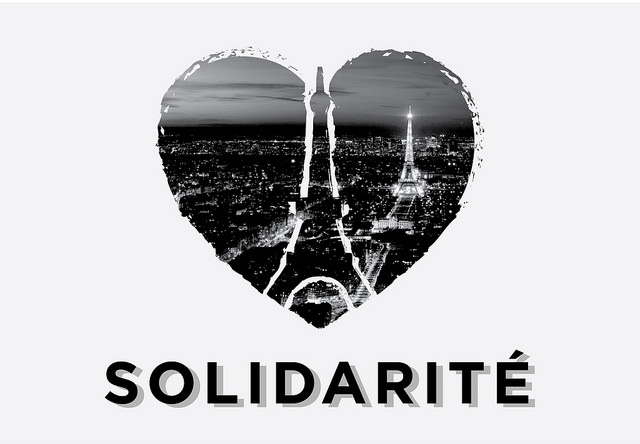 The deadly attacks in Paris last Friday have generated sincere expressions of shock, solidarity, mourning, and anger from around the world, yet that response also generated critical hashtags such as #selectivemourning. As many have discussed in social media and articles, bombings in Beirut the previous evening received only limited coverage in the US media and few mentions on social media. We can blame the media, but that is a little simplistic, as the media not only directs our interests but also reflects them. If sufficient numbers in the audience clamored for more information about the attacks in Beirut or previous attacks on civilians over the past twelve months in Nigeria, Kenya, Yemen, Afghanistan, and Pakistan, perpetrated by a range of forces, then the media coverage would increase. In fact, most who have pointed out the imbalance in the coverage are only doing so in the light of the Paris attacks. Few changed their Facebook profile photos for solidarity with Lebanon, despite it appearing in the news.
The deadly attacks in Paris last Friday have generated sincere expressions of shock, solidarity, mourning, and anger from around the world, yet that response also generated critical hashtags such as #selectivemourning. As many have discussed in social media and articles, bombings in Beirut the previous evening received only limited coverage in the US media and few mentions on social media. We can blame the media, but that is a little simplistic, as the media not only directs our interests but also reflects them. If sufficient numbers in the audience clamored for more information about the attacks in Beirut or previous attacks on civilians over the past twelve months in Nigeria, Kenya, Yemen, Afghanistan, and Pakistan, perpetrated by a range of forces, then the media coverage would increase. In fact, most who have pointed out the imbalance in the coverage are only doing so in the light of the Paris attacks. Few changed their Facebook profile photos for solidarity with Lebanon, despite it appearing in the news.
But why does Paris, then, receive such extensive, emotional coverage when some of the other attacks actually had more victims? We relate to the victims more when we can see ourselves and our loved ones as similar, including notions of race, class, culture, and experience. Many of us have either traveled to Paris, hope to travel to Paris, or know people who have traveled to, or possibly even live in, Paris. Beyond specific links to Paris, most of us can imagine attending a concert, eating in an restaurant, or attending a major sporting event in a modern city (which we often erroneously envision as western European or North American). We are less likely to imagine ourselves or people whom we know in a Nigerian village, a Kenyan school, or a Beirut neighborhood (however cosmopolitan — unbeknownst to us, of course — it might be). In other words, our response to Paris is largely about our own concerns with mortality and fear for our safety and the safety of those close to us rather than some abstract notion of human solidarity.
This point intersects with the ongoing debate in the US between the Black Lives Matter movement and those who counter that All Lives Matter, as the unbalanced responses to tragedy demonstrate that few if any of us honestly respond as if all lives matter equally. We as societies repeatedly sacrifice the lives of unknown others to preserve our freedoms, our continued access to cheap consumer goods, and our privileges. Civilian casualties are an aspect of war, embargoes, and economic globalization.
And this is why Black Lives Matter arose. Since few of us automatically place the same value on the lives of those with whom we do not immediately connect, because of a combination of factors such as race, experience, and socio-economics, marginalized communities have to push others to recognize the humanity of people in those communities. The All Lives Matter counter-assertion, coming primarily from the majority communities and those with privilege and power, reflects a strategic defense then of the status quo, not a principle for action.
Responding to horrors such as attacks on Paris or Beirut with grief and solidarity is important to the people of those cities and for ourselves. However, in identifying with select victims and becoming self-satisfied by our moral superiority as human beings, we should admit that the responses to Paris and Beirut are more about us, our interests and concerns, than Paris, Beirut, or our common humanity.
Image credit: “Solidarite” by Zlatko Vickovic via Flickr (CC BY 2.0)
